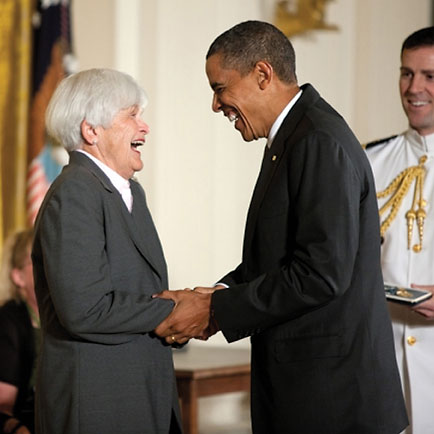President's Page
The sciences have been a key component of a Vassar education from the college’s founding; after all, the astronomer Maria Mitchell was the very first faculty member hired by Matthew Vassar. Over the past century and a half, the pursuit of scientific study at Vassar has led our alumnae and alumni to many unexpected places—including, this past August, to the White House.
There, President Obama presented Elizabeth Cushman Titus Putnam ’55 with the 2010 Presidential Citizens Medal — one of the highest awards the U.S. government can give to a civilian — for “performing exemplary deeds of service for her country and fellow citizens.” And it all started with her senior thesis at Vassar.
I have a feeling that recalling the details of your senior thesis might pose a challenge for some of you! That’s no problem at all for Liz Putnam, an unassuming woman whose pleasant manner might cause you, at first meeting, to miss what a determined individual she is. Liz’s thesis at Vassar was a proposal for the creation of a student conservation corps modeled on the New Deal’s Civilian Conservation Corps and aimed at tapping the energy of college students to help preserve our nation’s parks. In the mid-1950s there was growing concern that the underfunded National Park System was being overwhelmed by the public, prompting calls from some quarters to close the parks, which, in turn, inspired her to create the Student Conservation Association (SCA).

Since its inception 53 years ago, the SCA has been providing young people with hands-on opportunities to help conserve America’s natural resources. Over that time, it has grown to nearly 60,000 members, from all 50 states and 30 foreign countries. As President Obama presented Liz with her medal, an official proclamation was read: “The United States honors Elizabeth Cushman Titus Putnam for helping to ensure that America’s public lands and natural treasures are safeguarded for future generations.” All in all, not a bad result from a senior thesis (Liz got an “A,” by the way).
The White House wasn’t the only place where Liz’s achievements were recognized this past summer. At Reunion in June, Liz received a well-deserved Spirit of Vassar Award from the AAVC. In her speech at the Chapel upon receiving the honor, Liz took note of a Vassar hallmark, the close collaboration between faculty and students. She gave considerable credit for her success to her faculty advisor at Vassar, Dr. A. Scott Warthin Jr., chairman of what was then our Geology Department. “Without his vision, assistance, and tenacity I might not have been able to realize my dream,” Liz said, “and there might never have been an SCA. His faith in and support of a young person’s potential to make a difference made all the difference for me.”
Less than a week after receiving her award from the President in Washington, Liz was back on campus, touring the Vassar Farm and Ecological Preserve. This summer, for the first time in SCA’s history, the original inspiration for Liz’s thesis came full circle, as two of the organization’s interns were assigned to the Vassar Farm. There, they helped to protect the ecological preserve and promote its use as an educational resource, through such varied work as keeping watch for signs of infestation by the destructive emerald ash borer beetle, and clearing brush to keep the trails usable. One of those students was a newly minted Vassar graduate, Jason Carter of the Class of 2010, who described his SCA internship as “a chance to make positive change.”
All over campus today, Vassar faculty and students are working on innovative projects that respond to current concerns. Who knows where one of this year’s senior theses may lead?

Catharine Hill, President
Have comments about this article? Email vq@vassar.edu
